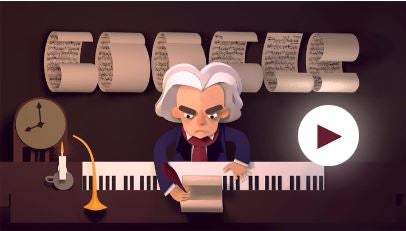Beethoven: Five facts you probably didn't know about the composer behind today's Google Doodle
From his unhappy love life to when he was actually born - here are the surprising facts about the German classical virtuoso's life

Your support helps us to tell the story
From reproductive rights to climate change to Big Tech, The Independent is on the ground when the story is developing. Whether it's investigating the financials of Elon Musk's pro-Trump PAC or producing our latest documentary, 'The A Word', which shines a light on the American women fighting for reproductive rights, we know how important it is to parse out the facts from the messaging.
At such a critical moment in US history, we need reporters on the ground. Your donation allows us to keep sending journalists to speak to both sides of the story.
The Independent is trusted by Americans across the entire political spectrum. And unlike many other quality news outlets, we choose not to lock Americans out of our reporting and analysis with paywalls. We believe quality journalism should be available to everyone, paid for by those who can afford it.
Your support makes all the difference.Google is celebrating the 245th anniversary of legendary German composer Ludwig van Beethoven with one of its famous animated doodles.
The musician and composer was born on this day in 1770 in Bonn - then part of the Holy Roman Empire - and went on to become one of the most celebrated composers of all time.
But here are some of the things you may not know about the legendary virtuoso:
1. No one is actually sure this is his birthday
There is no accurate parish record for when Beethoven was actually born.
17 December is the day he was baptised - which was usually the day people celebrated in the 18th century - but historians believe he may have actually been born a few days earlier.
2. No one really knows why he lost his hearing
Beethoven started losing his hearing when he was around 26 years old and by the last decade of his life he was completely deaf.
No one is entirely sure why he began to lose it but he suffered from a severe form of tinnitus - which meant he heard a severe “ringing” in his ears.
An autopsy after his death in 1827 reported he had had a “distended inner ear” that had developed lesions over time.

3. Despite this he composed some of his most celebrated works after he went deaf
Around 1811 he withdrew from conducting and performing and focused completely on composing.
Although he felt lonely and isolated after he withdrew from society - writing his hearing “haunted him everywhere like a ghost” - he produced some of his most renowned symphonies.
His famous ninth symphony being played for the first time in Vienna three years before he died.
4. His wrote the anthem for the European Union
In 1972, the Council of Europe voted to adopt the “Ode to Joy” from Beethoven’s ninth symphony as the official “Anthem of Europe”.
It was also used temporarily as Kosovo’s national anthem when they declared independence in 2008 until an official one was adopted later that year.
The movement was composed in 1823 from a poem written by German poet Friedrich Schiller in 1785 called "An die Freude" (To Joy).
5. He was unlucky in love
Beethoven’s love life was complicated by the class system of early 19th century Vienna. He first fell in love with a young countess called Julie in 1801 but could not marry her because he was a commoner.
A few years later he met and fell in love with Josephine Brunswick after he began giving her piano lessons in 1799.
She later married a count who died in 1804 and she could not marry Beethoven for fear of losing custody of her aristocratic children.
He wrote her at least 15 passionate love letters during his life and she is believed to be the mystery recipient of his famous 1812 “Immortal Beloved” love letter.
Join our commenting forum
Join thought-provoking conversations, follow other Independent readers and see their replies
Comments